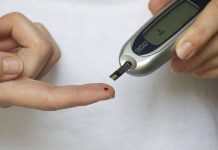Estrogen, the natural hormone that produces the sexual characteristics of women, has been known to have a protective effect on the inner walls of blood vessels for many years, making it easier for vessels to expand and relax to allow normal blood flow.
“Studies show that women have a much lower risk for cardiovascular events than men before the age of 60”
However, during menopause, the levels of estrogen in the body drop significantly, and the blood vessels become less flexible in accommodating the flow of blood. This can lead to a higher risk of heart problems and strokes. After the cessation of menses, women can take proactive steps to improve their heart health, to lower their risk for heart disease.
What Studies Say About Menopause and Heart Disease

Studies show that women have a much lower risk for cardiovascular events than men before the age of 60. However, after 60, the risk is about equal, and scientists believe this occurs because the protective effects of estrogen diminish after menopause.
Although the idea of restoring estrogen to the body to prevent heart disease would seem logical, studies have been mixed, with some research showing increased rates of blood clots and cardiac events, while others show some protection for women. For some individuals, the risks of taking hormones may outweigh the benefits. Your doctor can help you determine if hormone replacement therapy would be beneficial for your health.
Signs and Symptoms of Heart Disease During Menopause
Women should also be aware that heart attacks often have different symptoms in women than in men. Women are more likely to experience abdominal, shoulder or back pain, during a heart event. Throat or jaw pain can also occur. You may experience a feeling of severe fatigue.
Nausea and vomiting may be a sign of a heart event. You may feel light-headed or dizzy, or may sweat profusely. You may feel short of breath or have pain in one or both arms. These are possible symptoms of a heart problem that should receive immediate medical attention.
Menopause and Heart Disease Prevention and Treatment Options
“Menopause and heart disease treatment may include various medications or surgical procedures to increase blood flow in the heart”

Women who have diabetes and who smoke are at higher risk for heart disease than the general population. Similarly, those with high cholesterol levels, high blood pressure or who are obese are also at higher risk. Individuals who have a sedentary lifestyle, or with a family history of heart disease, should take steps to lower their risk. If you have any of these conditions, you should be under the care of a physician who can help to lower your risk.
Hormone replacement therapy to replace estrogen in the body is not always the best option for preventing heart disease in women. Talk to your doctor about menopause and heart disease prevention to determine the right approach for your individual health needs. Take steps in your daily life to protect your heart health.
Eat a healthy diet, low in fat and high in antioxidants from fresh fruit and vegetables. If you smoke, talk to your doctor about ways to stop. Exercise regularly, whether taking simple walks or more strenuous activities. Maintain a healthy weight. Menopause and heart disease treatment may include various medications or surgical procedures to increase blood flow in the heart.
When To See Your Doctor
“Prevention of heart disease is an important consideration for older women. You can still maintain heart health by making changes in diet and lifestyle”

Regular annual visits to your doctor are among the most important steps you can take for prevention of heart disease. If you have health conditions associated with an increased risk for heart disease, work closely with your doctor to manage the problem. If you experience frequent thirst and urination, it could be a sign of diabetes, a condition that increases your risk for heart disease.
Test your blood pressure regularly, and see your doctor if levels go above the normal range. If you have breathing problems, see your physician for diagnosis and treatment. Heart palpitations or irregular heart rhythms should also be investigated. Menopause and heart disease treatment can help to extend your lifespan and improve your quality of life.
Prevention of heart disease is an important consideration for older women. You can still maintain heart health by making changes in diet and lifestyle. Simple measures, such as lowering fat consumption and getting regular exercise can have a significant impact on your health. Knowing about menopause and heart disease risk can help you to take the steps needed to maintain good health at every age.
Sources & References:
www.heart.org/en/health-topics/consumer-healthcare/menopause-and-heart-disease
www.my.clevelandclinic.org/health/articles/16979-estrogen–hormones
www.ncbi.nlm.nih.gov/pmc/articles/PMC4490077/
www.mayoclinic.org/diseases-conditions/heart-disease/in-depth/heart-disease/art-20046167





















